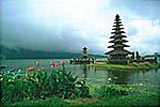| 
MEDIA
THREAT TO RELATIONS, SAYS INDONESIAN ENVOY
By LINCOLN
WRIGHT CANBERRA
posted 13th Feb 00
Indonesia's new ambassador in Canberra, Arizal Effendi, hopes to rebuild relations
with Australia but warned yesterday that unless the media toned its act down,
the two nations could live without each other - literally. In
his first major address since arriving last November, Mr Effendi told the National
Press Club that the media in Australia had to become more responsible in its coverage
of Indonesian issues and that restoring relations between the countries would
not be an easy task. "If the Press, an influential component in public opinion-making,
continues to engage in mutual incrimination and stereotyped reporting, the inherent
complexities in our relations will deepen rather than ameliorate," Mr Effendi
said. As an example of how an allegedly distorted media can poison relations,
Mr Effendi cited a newspaper report that the Australian Defence Force had rejected
many of the young people who wanted to sign up for service in East Timor on the
grounds that they really just wanted to fight Indonesians. Mr Effendi said, "There
is no doubt that the enmity expressed by those young Australians towards Indonesia
was influenced by the inflammatory dubious reporting . . ."
His criticism of the media, however, did nothing to stop the barrage of ironic
questions from the Canberra Press Gallery about the violence in East Timor, human-
rights violations, the need to bring senior military officers to justice and whether
General Wiranto should quit. Mr Effendi was only saved from this line of questioning
by Australia's former ambassador to Jakarta, Richard Woolcott, one of the architects
of the now-defunct policy of closer ties with the former Suharto regime. Mr Woolcott
wanted to change the subject to Indonesia's economic growth rate. But there was
more than taming an aggressive media on Mr Effendi's mind. In a veiled criticism
of Australia's organising role in East Timor, he said that the "constant lecturing"
and the offer of easy solutions to complex cultural problems was useful only to
gain domestic support." Even
more worrying is the jingoism of using humanitarian pretext to justify unilateral
armed intervention into the internal affairs of a developing country, including
by way of a coalition of nations outside the framework of the United Nations,"
he said. Mr Effendi carefully explained that Indonesia's new democratic foreign
policy would resist the trend for some nations to try and use humanitarian considerations
as a justification for intervention in other countries. Outlined by Indonesia's
Foreign Minister Shihab last year, Jakarta wants to strengthen its ties with other
developing countries, especially India and China. Acting on the direct instructions
of Indonesia's President Wahid, Mr Effendi described his diplomatic task in Australia
as ending the deepening mistrust between the two nations brought about by the
East Timor crisis. Since arriving last year, however, Mr Effendi said he had become
more optimistic about rebuilding the relationship. The hotline between Canberra
and Jakarta and Foreign Minister Alexander Downer's trip to Jakarta had helped.
President Wahid's visit to Australia, the first in 25 years for an Indonesian
president, has been postponed from March until May.t |